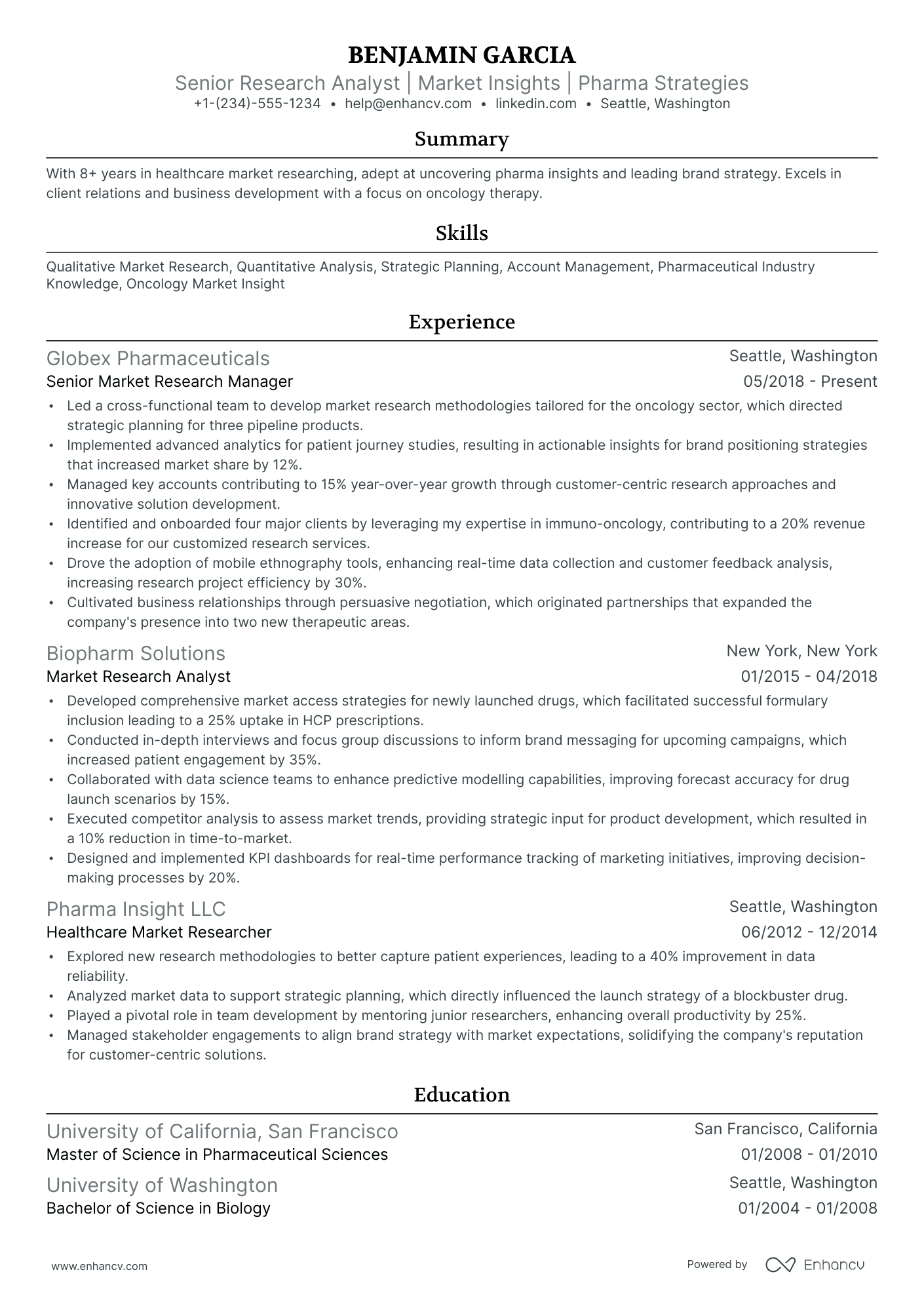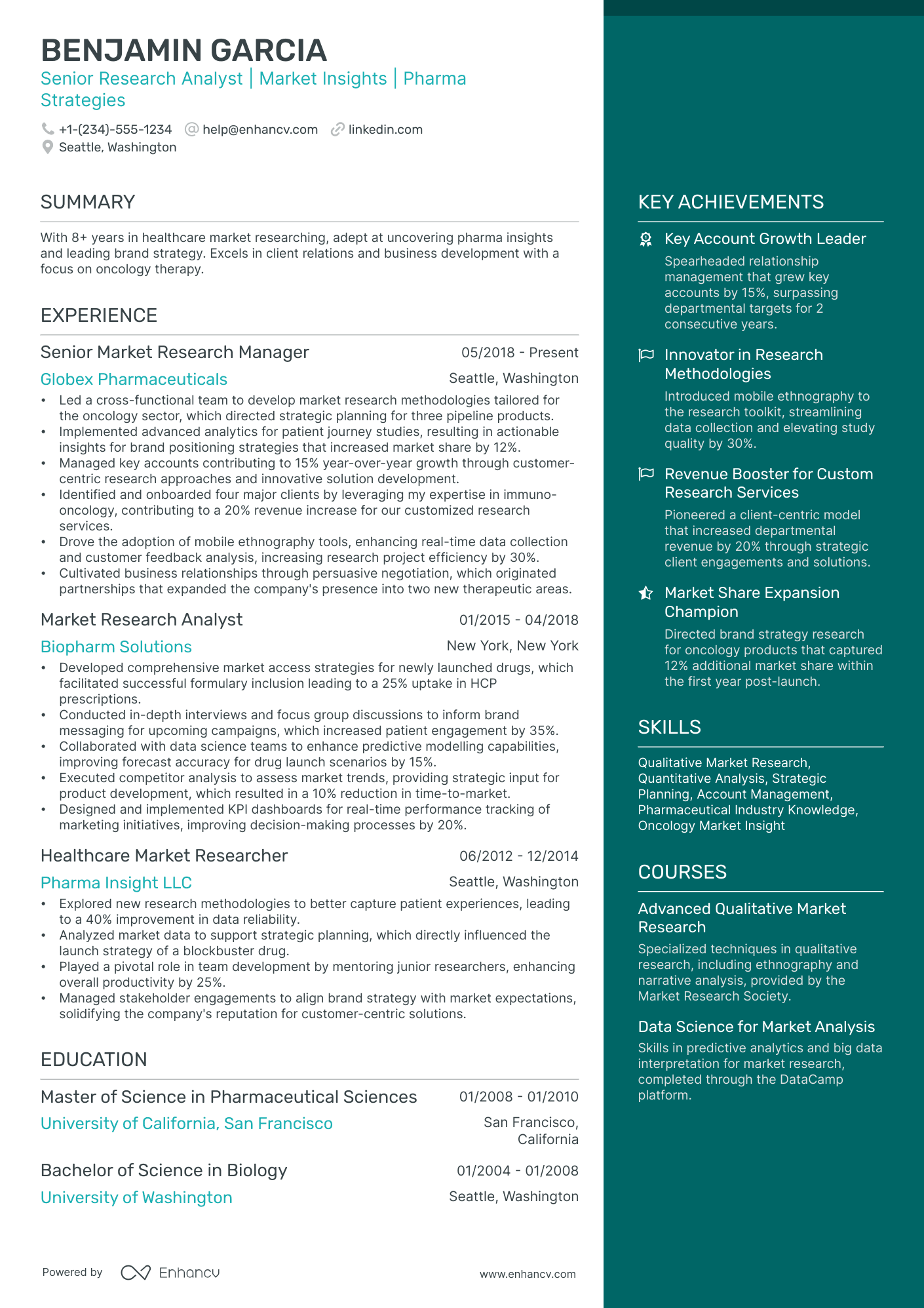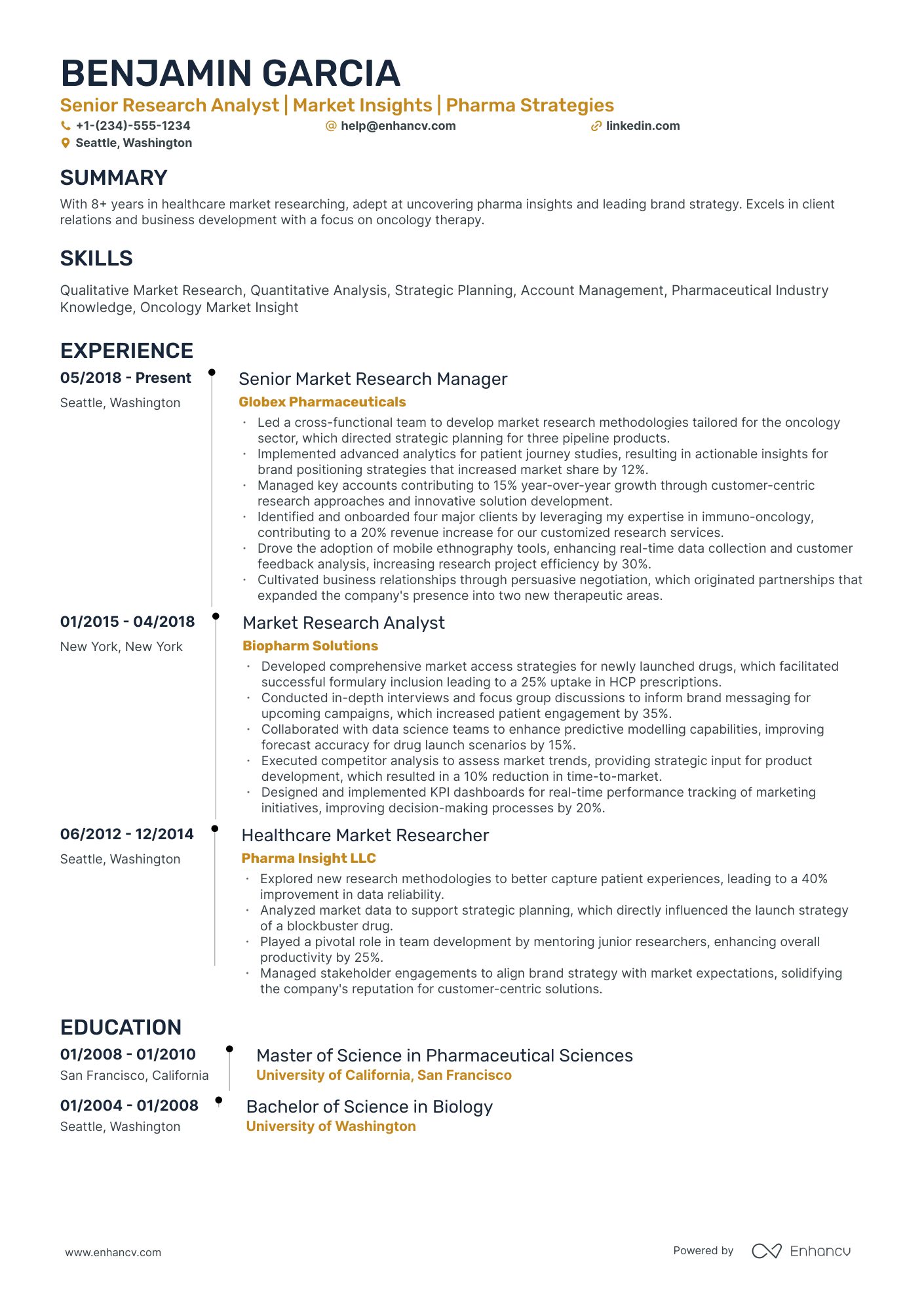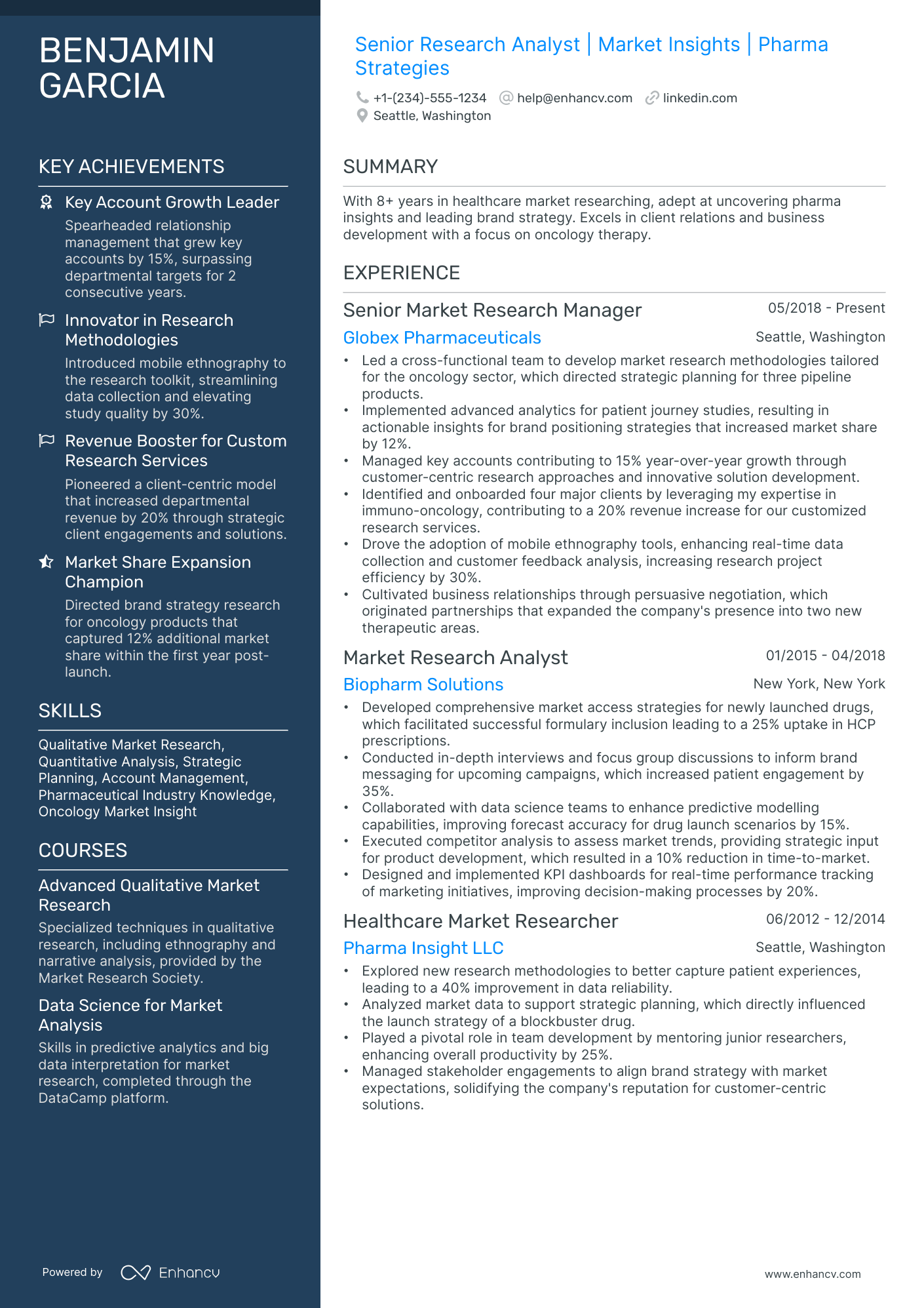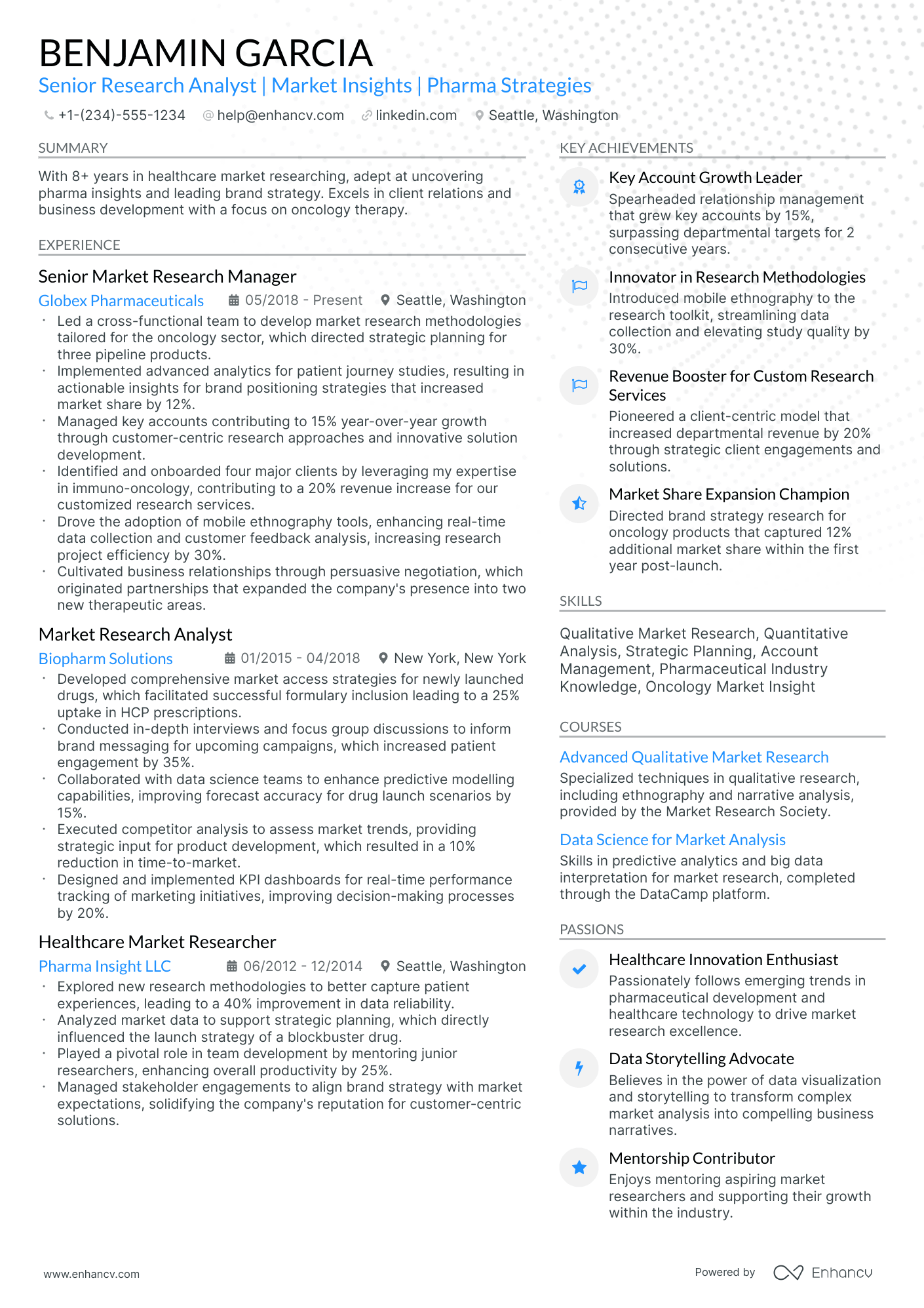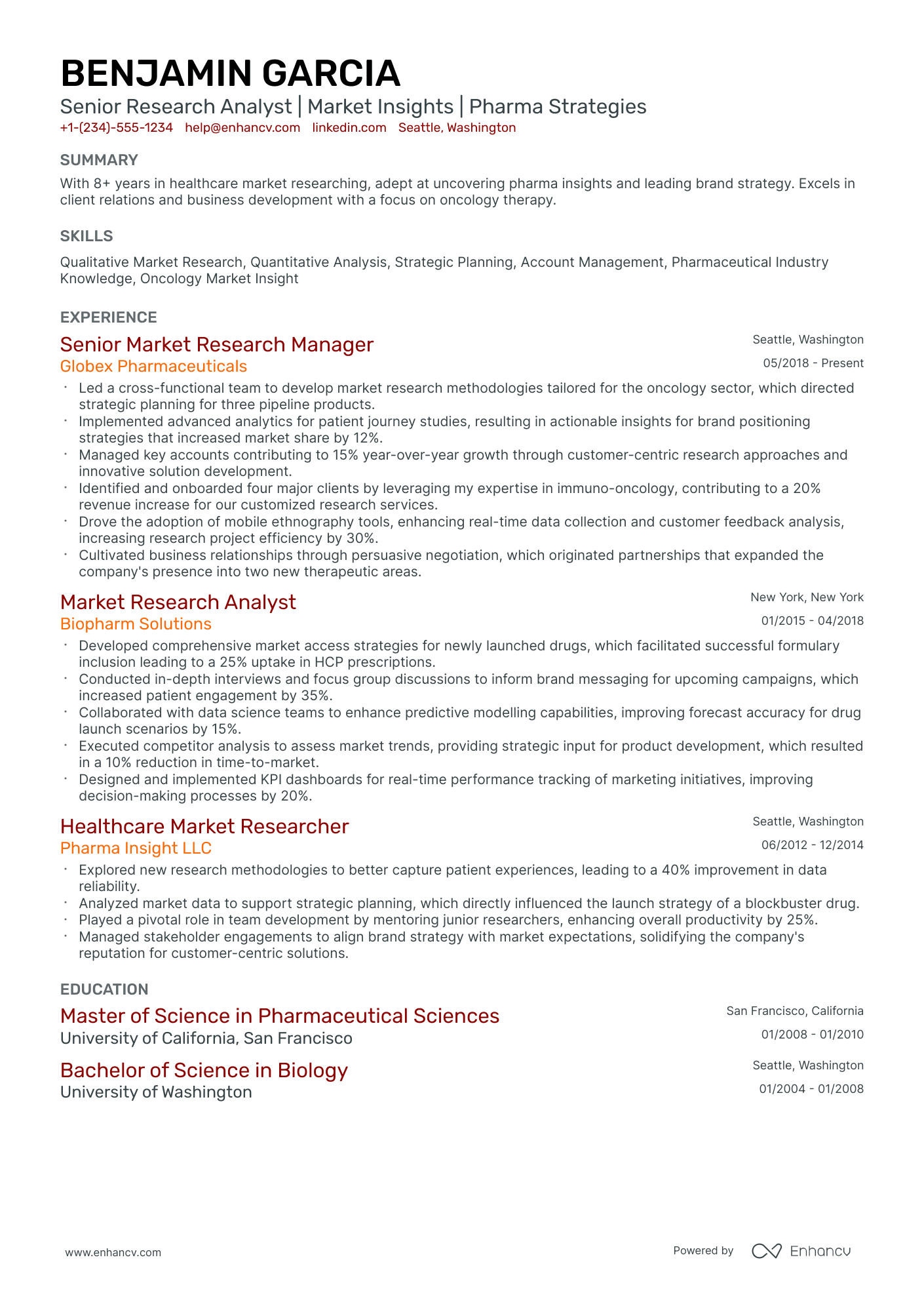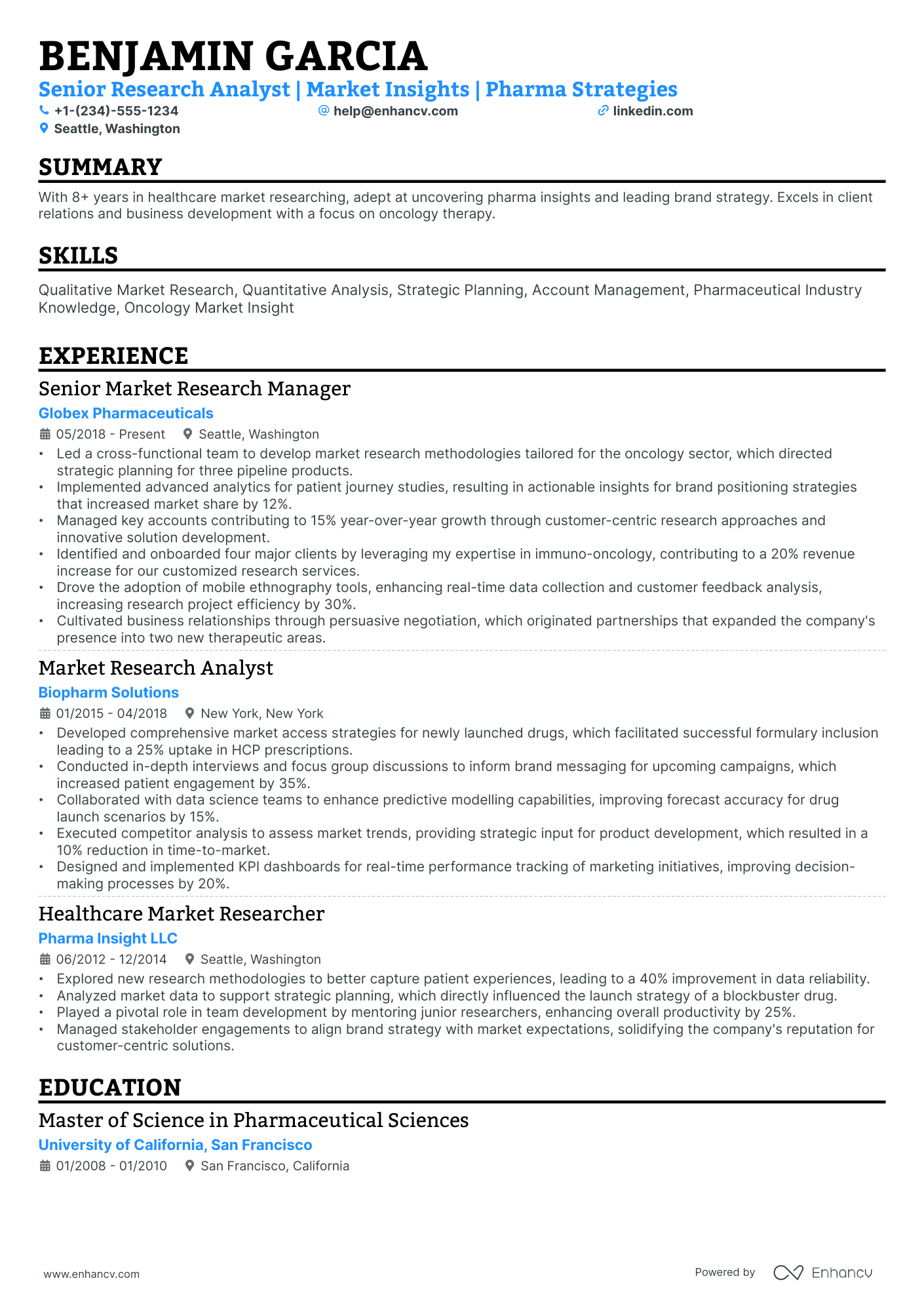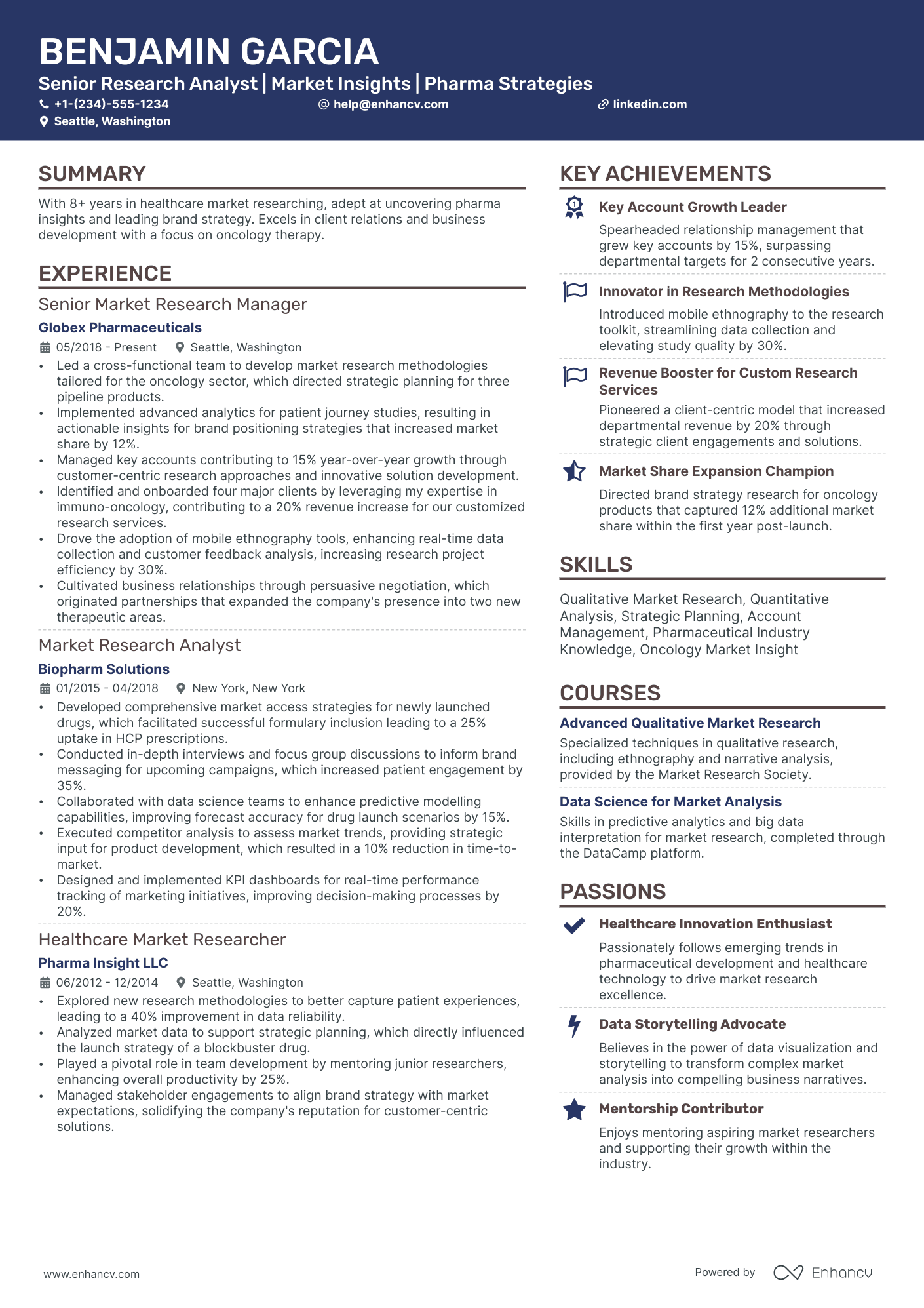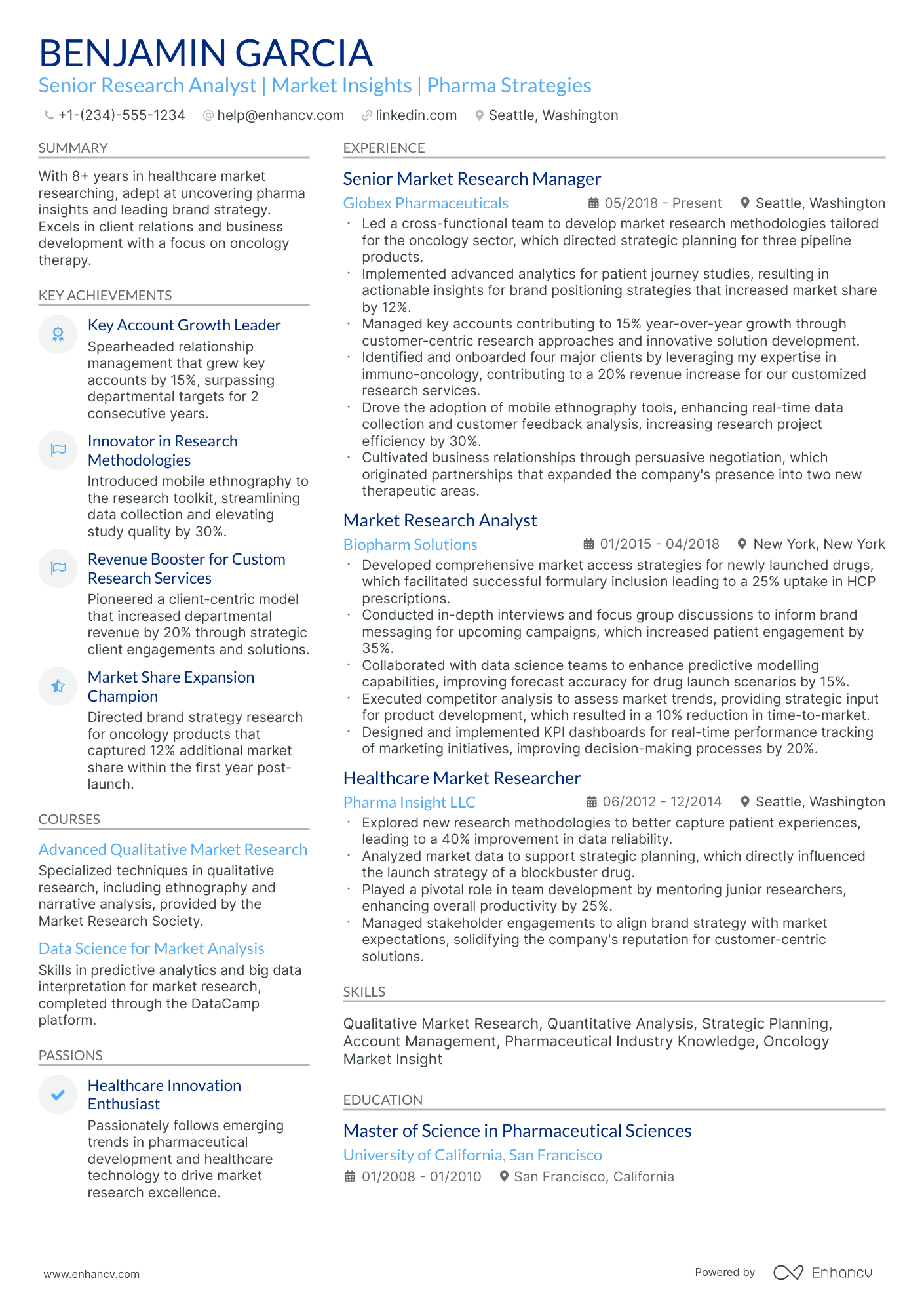As a research director, articulating the breadth of your expertise while maintaining clarity can be a major resume challenge. Our guide can help you succinctly highlight your accomplishments and tailor your resume to showcase your leadership skills in managing complex research projects.
- Incorporate research director job advert keywords into key sections of your resume, such as the summary, header, and experience sections;
- Quantify your experience using achievements, certificates, and more in various research director resume sections;
- Apply practical insights from real-life research director resume examples to enhance your own profile;
- Choose the most effective research director resume format to succeed in any evaluation process.
Best practices for the look and feel of your research director resume
Before you even start writing your research director resume, first you need to consider its layout and format.
What's important to keep in mind is:
- The reverse-chronological resume is the most widely used format to present your experience, starting with your latest job.
- Your research director resume header needs to include your correct, professional contact details. If you happen to have a professional portfolio or an updated LinkedIn profile, include a link to it.
- Ensure your resume is no longer than two pages - you don't have to include irelevant experience on your resume just to make it look longer.
- Unless specified otherwise, submit your resume in the most popular format, the PDF one, as this will ensure your research director resume isn't altered.
Be aware of location-based layout differences – Canadian resumes, for instance, might differ in format.
Upload & Check Your Resume
Drop your resume here or choose a file. PDF & DOCX only. Max 2MB file size.
PRO TIP
Listing your relevant degrees or certificates on your research director resume is a win-win situation. Not only does it hint at your technical capabilities in the industry, but an array of soft skills, like perseverance, adaptability, and motivation.
Recruiters' preferred research director resume sections:
- A header with relevant contact information and headline, listing your current job title
- A resume summary or objective pinpointing what is most impressive about your expertise (that aligns with the role)
- An experience section highlighting the specifics of your responsibilities and achievements
- A skills sidebar to intertwine job advert keywords with your unique talents
- An education and certifications sections to serve as further accreditation to your professional experience
What recruiters want to see on your resume:
- Proven track record of leading and managing research projects from inception to completion, highlighting successful outcomes and publications.
- Demonstrated ability to secure funding through grants, partnerships, or other financial resources.
- Strong leadership and team management skills, with examples of building and mentoring a diverse and high-performing research team.
- In-depth knowledge of the specific field of research, as evidenced by peer-reviewed publications, conference presentations, and citations.
- Experience in developing strategic partnerships with industry, academia, and government agencies to further research objectives and innovation.
Defining your professional expertise in your research director resume work experience section
The work experience section, often the most detailed part of your resume, is where you discuss your past roles and achievements. To effectively list your experience, consider these four key tips:
- Align your expertise with the job requirements. It's vital to integrate keywords matching the job criteria to pass initial assessments;
- Show, don’t just tell. Quantify your responsibilities by stating your actual achievements in previous roles;
- Include measurable metrics. For instance, how did your performance impact the annual ROI?
- Highlight crucial industry skills. Mention both technological knowledge and interpersonal skills in this section.
These guidelines will help you craft an impressive research director resume work experience section that is bound to catch recruiters' attention.
- Led a cross-functional team of 35 researchers and associates in developing a multi-million dollar gene therapy project, securing a 23% increase in funding for the department.
- Spearheaded the incorporation of machine learning algorithms into health research analysis, boosting data processing efficiency by 40%.
- Fostered partnerships with 5 leading pharmaceutical companies, which expanded the scope of clinical trials and accelerated the product development pipeline by 18 months.
- Managed a portfolio of over $50 million in research grants, ensuring all projects aligned with the strategic priorities of the organization and met rigorous compliance standards.
- Implemented a new knowledge dissemination strategy that increased publication output by 60% within two years, elevating the institute's reputation in the academic community.
- Launched a successful initiative to expand the research internship program, resulting in a 35% rise in top-tier university collaborations.
- Directed groundbreaking research in renewable energy sources, contributing to a partnership with the Department of Energy that attracted $15 million in additional funding.
- Improved operational efficiency by overhauling the project management system, decreasing project lead times by an average of 22%.
- Cultivated a dynamic research culture which helped retain top talent and reduce staff turnover by 30%.
- Initiated and managed a collaborative cancer research program that brought together 10 leading institutions, sharing resources to enhance overall research capacity.
- Pioneered a data-driven approach to budget allocation which prioritized high-impact projects, contributing to a 25% increase in successful grant applications.
- Oversaw the development and implementation of an ethics compliance framework that became a benchmark for industry research standards.
- Orchestrated the overhaul of the chemical research division, introducing cutting-edge synthetic biology techniques that led to the creation of 3 new patented compounds.
- Developed a mentorship program designed to accelerate the progression of junior researchers, effectively reducing time-to-competence by 50%.
- Led the negotiation of international research agreements that expanded the company's market presence in Europe and Asia by 20%.
- Championed the development of an AI-based predictive analysis tool for market research, which became instrumental in strategic decision-making and resulted in a 15% increase in ROI.
- Oversaw the adoption of agile methodologies within the research team, enhancing project turnaround time and productivity by approximately 33%.
- Curated a series of successful industry-academic partnerships that led to breakthroughs in wearable technology applications.
- Launched an international research initiative on global health that brought together over 25 organizations, creating new insights into disease prevention and treatment strategies.
- Developed a comprehensive data governance protocol to ensure the integrity and security of sensitive research data, enhancing the trust and collaboration among international partners.
- Orchestrated the transition to a hybrid cloud data infrastructure, dramatically improving scalability and collaborative potential of research projects.
- Transformed company’s approach to consumer behavior research by implementing a unified data analytics platform that harmonized insights across various product lines.
- Initiated a competitive intelligence unit within the research department that directly contributed to a 10% increase in market share over a three-year period.
- Delivered a series of workshops and training sessions for research staff on advanced statistical methods and tools, significantly enhancing the team’s analytical capabilities.
The following content includes information from "O*NET OnLine" by the U.S. Department of Labor, Employment and Training Administration (USDOL/ETA). Used under the CC BY 4.0 license. The data represents the top responsibilities present on the task lists for research director professionals.
Top Responsibilities for Research Director:
- Design or use assessments to monitor student learning outcomes.
- Recruit, hire, train, and terminate departmental personnel.
- Direct, coordinate, and evaluate the activities of personnel, including support staff engaged in administering academic institutions, departments, or alumni organizations.
- Advise students on issues such as course selection, progress toward graduation, and career decisions.
- Plan, administer, and control budgets, maintain financial records, and produce financial reports.
- Formulate strategic plans for the institution.
- Establish operational policies and procedures and make any necessary modifications, based on analysis of operations, demographics, and other research information.
- Provide assistance to faculty and staff in duties such as teaching classes, conducting orientation programs, issuing transcripts, and scheduling events.
- Represent institutions at community and campus events, in meetings with other institution personnel, and during accreditation processes.
- Prepare reports on academic or institutional data.
Quantifying impact on your resume
- Highlight the number of research projects directed, showcasing leadership and the ability to handle multiple tasks simultaneously.
- Include the total amount of grant funding secured, demonstrating financial acumen and the ability to attract essential research investments.
- Mention the percentage increase in publications under your direction, emphasizing the enhancement of research output and impact.
- Specify the number of patents filed or obtained, highlighting innovation and contribution to the field's advancement.
- Detail the number of researchers supervised or mentored, indicating a commitment to team development and academic growth.
- State the improvement metrics in research efficiency or cost reduction achieved, reflecting operational management skills.
- Quantify the citation impact of research conducted, illustrating the influence and reach of the work within the scientific community.
- Provide the number of conferences or symposia chaired, demonstrating recognition as an authority in the field and organizational capabilities.
Action verbs for your research director resume
No relevant experience - what to feature instead
Suppose you're new to the job market or considering a switch in industry or niche. In such cases, it's common to have limited standard professional experience. However, this isn't a cause for concern. You can still craft an impressive research director resume by emphasizing other sections, showing why you're a great fit for the role:
- Emphasize your educational background and extracurricular activities to demonstrate your industry knowledge;
- Replace the typical experience section with internships or temporary jobs where you've gained relevant skills and expertise;
- Highlight your unique skill set, encompassing both technological and personal abilities;
- Showcase transferable skills acquired throughout your life and work experiences so far.
Recommended reads:
PRO TIP
The more time and effort you've put into obtaining the relevant certificate, the closer to the top it should be listed. This is especially important for more senior roles and if the company you're applying for is more forward-facing.
Creating your research director resume skills section: balancing hard skills and soft skills
Recruiters hiring for research director roles are always keen on hiring candidates with relevant technical and people talents. Hard skills or technical ones are quite beneficial for the industry - as they refer to your competency with particular software and technologies. Meanwhile, your soft (or people) skills are quite crucial to yours and the company's professional growth as they detail how you'd cooperate and interact in your potential environment. Here's how to describe your hard and soft skill set in your research director resume:
- Consider what the key job requirements are and list those towards the top of your skills section.
- Think of individual, specific skills that help you stand out amongst competitors, and detail how they've helped you succeed in the past.
- Look to the future of the industry and list all software/technologies which are forward-facing.
- Create a separate, technical skills section to supplement your experience and further align with the research director job advert. Find the perfect balance between your resume hard and soft skills with our two lists.
Top skills for your research director resume:
Statistical Analysis Software (e.g., R, SAS)
Data Visualization Tools (e.g., Tableau, Power BI)
Qualitative Research Methods
Quantitative Research Methods
Project Management Software (e.g., Asana, Trello)
Survey Design Tools (e.g., Qualtrics, SurveyMonkey)
Database Management Systems (e.g., SQL, NoSQL)
Machine Learning Algorithms
Literature Review and Analysis Tools
Grant Writing and Fundraising Techniques
Leadership
Critical Thinking
Communication
Collaboration
Problem-Solving
Time Management
Strategic Planning
Adaptability
Mentoring
Networking
Next, you will find information on the top technologies for research director professonals from "O*NET OnLine" by the U.S. Department of Labor, Employment and Training Administration (USDOL/ETA). Used under the CC BY 4.0 license.
Top technologies for Research Director’s resume:
- Microsoft Dynamics
- Oracle PeopleSoft
- Blackboard software
- Microsoft Access
- Google Sites
PRO TIP
If the certificate you've obtained is especially vital for the industry or company, include it as part of your name within the resume headline.
Showcase academic background with education and certifications' sections
Listing your education and certifications should be a rudimentary part of your resume writing.
Including your relevant academic background - in the form of your higher education degree and niche-specific certificates - will prove knowledge of the industry.
For your education section:
- Start by including your degree, followed by start and graduation dates, as well as the institution;
- You could include relevant coursework, major/minor , or GPA, only if your've just graduated from college or if this information would further support your application;
- If you have an "ongoing" degree, you can still list it in case you think your diploma can impress recruiters or it's required;
Follow a similar logic for your certifications section by listing the institution, alongside dates you've obtained the certificate. For some of the most recent and relevant industry certificates , check out the next part of our guide:
The top 5 certifications for your research director resume:
- Project Management Professional (PMP) - Project Management Institute (PMI)
- Certified Research Administrator (CRA) - Research Administrators Certification Council (RACC)
- Professional Researcher Certification (PRC) - Insights Association
- Certified Clinical Research Professional (CCRP) - Society of Clinical Research Associates (SOCRA)
- Regulatory Affairs Certification (RAC) - Regulatory Affairs Professionals Society (RAPS)
The content below includes information from "O*NET OnLine" by the U.S. Department of Labor, Employment and Training Administration (USDOL/ETA). Used under the CC BY 4.0 license. The data represents the top associations for research director professionals.
Top US associations for a Research Director professional
- American Association of College Registrars and Admissions Officers
- American Association of Community Colleges
- American Association of State Colleges and Universities
- American College Personnel Association
- Association for Career and Technical Education
PRO TIP
Highlight any significant extracurricular activities that demonstrate valuable skills or leadership.
Recommended reads:
Which one to use: a resume summary or a resume objective?
The research director resume summary or objective serves as a good introduction to your experience for recruiters.
Have you ever wondered which one (the summary or objective) will be more appropriate for your research director resume?
- If you are a less experienced professional, write a resume objective statement. The objective is about three sentences long and provides recruiters with information about your career goals, strengths, and achievements . It should basically denote how you see yourself in this particular role, and what is your relevant experience and/or know-how;
- If you happen to have plenty of relevant experience, select your most impressive achievements for your resume summary. The summary is no longer than five sentences and serves as a storytelling instrument - highlighting your greatest career wins . Don't forget to align your summary with the job requirements to ensure your resume stays relevant to the role.
Read on for more information and examples of resume summaries and objectives from real world professionals.
Resume summaries for a research director job
- Accomplished research director with over 15 years of ground-breaking work in oncology, adept at leveraging advanced data analysis techniques and molecular biology expertise. Instrumental in developing a new cancer drug that increased patient survival rates by 30%, aiming to tackle more unsolved medical mysteries through rigorous, data-driven research strategies.
- Dynamic leader transitioning from a 12-year tenure as a Senior Data Scientist in AI technology to the field of medical research. Exceptional skills in big data interpretation and neural network development, striving to cross-pollinate AI with genetic research to expedite discovery processes and improve patient outcomes.
- Experienced Bioinformatics research director with a 10-year track record of spearheading computational biology departments. Revolutionized the approach to genomic data analysis which led to the identification of two novel gene therapies. Excels in team leadership and has a robust publication record in high-impact scientific journals.
- Former Aerospace Engineer pivoting to Biomedical Research with a solid foundation in systems engineering and analytical problem-solving. Keen to apply precise, metrics-driven methodologies to the biological sciences and leverage a decade of project management experience to guide research teams towards groundbreaking innovation in medical technology.
- To build upon a foundational enthusiasm for genetic engineering with a focus on developing innovative solutions to complex biological challenges. With no direct experience in the research field, my fresh perspective coupled with a rigorous scientific training background is poised to contribute valuable insights and creative approaches to research projects.
- Aiming to transition from software development into biomedical research, my objective is to harness 8 years of experience in crafting sophisticated algorithms and apply this computational prowess for advancing the understanding of genetic diseases. Enthusiastic about acquiring hands-on experience and keen on making substantial contributions to novel research endeavors.
Optimize your resume summary and objective for ATS
Drop your resume here or choose a file.
PDF & DOCX only. Max 2MB file size.
Average salary info by state in the US for research director professionals
Local salary info for Research Director.” Source: My Next Move, National Center for O*NET Development. Accessed 10/15/2024
| State | Average Salary (in USD) |
|---|---|
| US National Average | $102,610 |
| California (CA) | $125,990 |
| Texas (TX) | $98,620 |
| Florida (FL) | $90,480 |
| New York (NY) | $139,900 |
| Pennsylvania (PA) | $99,950 |
| Illinois (IL) | $85,710 |
| Ohio (OH) | $83,520 |
| Georgia (GA) | $103,720 |
| North Carolina (NC) | $100,480 |
| Michigan (MI) | $103,460 |
Additional valuable research director resume sections to stand out
When assessing candidate applications, recruiters are often on the lookout for elements that go beyond meeting standard requirements and technical expertise.
This is where extra sections could play a key role in showcasing your unique skill set and personality.
Make sure to include sections dedicated to:
- How you spend your free time, outside of work. The interests resume section also goes to show your personality and transferrable skills; and may also serve to fill in gaps in your experience;
- Most innovative work. The projects resume section brings focus to what you're most proud of within the field;
- How you're able to overcome language barriers. The language resume section is always nice to have, especially if communication would be a big part of your future role;
- Industry-wide recognitions. Remember that the awards resume section should highlight your most noteworthy accolades and prizes.
Key takeaways
We trust that this Enhancv guide has been informative and useful. To summarize the essential points:
- Opt for a simple and readable format, focusing more on your research director achievements rather than just duties;
- Emphasize your accomplishments in the research director experience section over mere responsibilities;
- If lacking relevant experience, utilize various resume sections like education and volunteering to demonstrate your suitable skill set;
- Never overlook the significance of pertinent higher education, training, and certifications;
- Incorporate diverse sections in your resume to highlight not just your skills expertise but also your personality.
